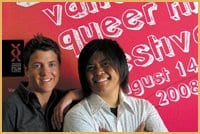Originally just three days long and managed by a half-dozen volunteers without any funding, Vancouver’s Queer Film Festival celebrates its 20th anniversary this year when it opens Aug 14.
Though it scarcely resembles its humble origins, the festival has continued to thrive by staying true to its film fest roots while expanding its role within the queer community.
Out on Screen (OOS), the society that produces the annual festival, now boasts paid staff, year-round programming, and over 250 volunteers.
Even its modest headquarters on Hastings St are a long way from the West End living room where the original board members gathered to hash out everything from the festival lineup to gender politics.
Conceived as a cultural component for the 1990 Gay Games, OOS held its first film festival in 1989 as a trial run and is now the second oldest festival of its kind in Canada. Louise Pohl, one of OOS’ founding board members, recalls some of the initial challenges.
“I hadn’t done anything like this before, and then before I knew it I was president of the board,” she laughs. “We had no money. In the first year we did a 24-hour Worst Movie Marathon and used the money from that for the first festival.”
Chris Adkins, also part of the founding festival board, recalls the challenge of finding films for the first festival.
“There were a lot fewer outlets then,” Adkins says. “It was tough finding out about films and where to get them. Now there’s a huge circuit of queer film festivals.”
That first festival showed just four features and a couple of short films; the first film the festival screened, Salut Victor, offered a rare glimpse of two men falling in love in a nursing home. This year, there are 110 features and shorts in the festival lineup.
Pohl says she was particularly drawn to volunteer with Out on Screen as it offered her a chance to work with both gays and lesbians towards a common goal: finding films to reflect as many queer realities as possible.
“It was lesbians and gay men working together for the first time, and I think there’s a lot of polarizing that goes on in the community,” she says. “I wanted to do something that would cross that divide.”
Another founding member, Graham Peat, recalls the difficulty in uniting these voices under one festival.
“It was a challenge because there were never as many films made back then for women or by women about lesbian issues as there were about gay men, who had more power, more cameras, and everything else,” Peat says.
As the community became more united in its efforts to promote the arts, there was also an internal shift towards stabilizing the administration, taking OOS to the next level by providing more opportunities for community involvement and engagement. Having survived its first five years without funding, OOS received its first grant in 1993, beginning its gradual evolution into a multi-faceted arts and culture organization.
Vanessa Kwan, OOS’ current director of programming, says she’s thrilled by the festival’s expansion into workshops, master classes, performances, parties, visual arts shows and musical events.
“Film is a really great medium, and we kind of treat it as a gateway to all the other things that artists are doing in tandem with their film practices,” Kwan says. “In terms of pushing the medium forward, we’re really interested in seeing all those other art forms that intersect with film in a meaningful way.”
In 2004, OOS launched the Out in Schools project, bringing independent queer film into high schools. The Queer History Project started in 2007, commissioning works that will help document local queer voices and their stories. On Aug 14, the history project’s online component will launch as an interactive website where queer people will be invited to share videos, audio, photos, and other art forms.
“It’s the idea that the community will be able to recreate, recapture, re-imagine, and explore queer histories,” says Drew Dennis, OOS’ executive director. “[The community] doesn’t really have an oral history that’s passed down from generation to generation. Very rarely are we born into queer families.”
Pohl too is grateful to see OOS continued expansion. “It just makes my heart warm getting the program every year,” she says. ” It was all so grassroots compared with how it is now. It was a lot of hard work and a very steep learning curve. We were there because we really wanted this to happen.”
Dennis and Kwan are equally committed to making it happen, and neither wants to dwell too long basking in the glory of OOS’ 20th anniversary. It’s “important to think about the next 20 years now,” says Dennis.

 Why you can trust Xtra
Why you can trust Xtra


